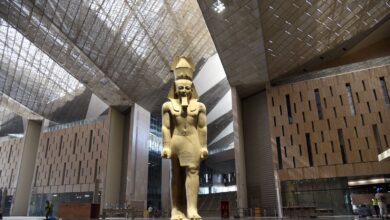It is impossible to implement the administrative court's decision to return certain privatized companies to the state because the companies' actual situation in terms of factors such as employment have changed, state TV quoted Minister of International Cooperation Fayza Abul Naga as saying on Saturday.
Prime Minister Kamal al-Ganzouri has asked officials at the State Lawsuits Authority to follow up the challenges filed by the companies in question against the administrative court's decision, Abouelnaga told reporters.
Abouelnaga said that the government's position is based on settling the disputes in a friendly way, so as not to harm the interests of Egypt or employees and to preserve investors' rights.
A number of investors have filed lawsuits against the Egyptian government at the International Centre for Settlement of Investment Disputes (ICSID), and one demanded US$1 billion compensation, Abouelnaga said, adding that Egypt's experience with international arbitration has not been positive. She said investors were ready to settle without resorting to international arbitration.
She said Ganzouri held an extraordinary meeting to discuss the public sector in light of a decline in exports from many companies and an accumulation of debt, and because four company owners went to the ICSID when the administrative court ruled that the companies must be returned to the state.
Abouelnaga said Ganzouri ordered a quick study of the status of 100 business sector companies that are suffering, and he recommended resolving disputes with company owners amicably to avoid international arbitration.
The government has not taken a decision to ban privatization and indeed has plans to sell more state-owned companies according to specific criteria, she said, adding that what determines privatization is efficiency.
The problems of some state-owned companies could be settled through injecting new funds and appointing competent managers rather than selling them, Abouelnaga said.
She said that the textile sector, which employs 70,000 workers, needs to be restructured in order to recover and meet the needs of its employees.
In recent months, a series of Egyptian court decisions have challenged privatization deals.
In September, a court ordered that three industrial companies be returned to the state, as the deals that privatized them squandered public funds.
The court ruled that the sales of Tanta Flax and Oil Co., Misr Shebin al-Kom Spinning and Weaving and al-Nasr Company for Steam Boilers be annulled, and the companies and their assets be returned to state ownership.
In the same month another court ruled that the sale of more than 50 percent of Nile Cotton Ginning Co. in the late 1990s violated regulations, as its shares were substantially undervalued.
Lawyers and activists have pointed to numerous violations and the systematic squandering of public funds in such deals during the terms of former prime ministers Atif Sidqi and Atif Ebeid, as well as that of Ganzouri, who served in the same post in the 1990s.




